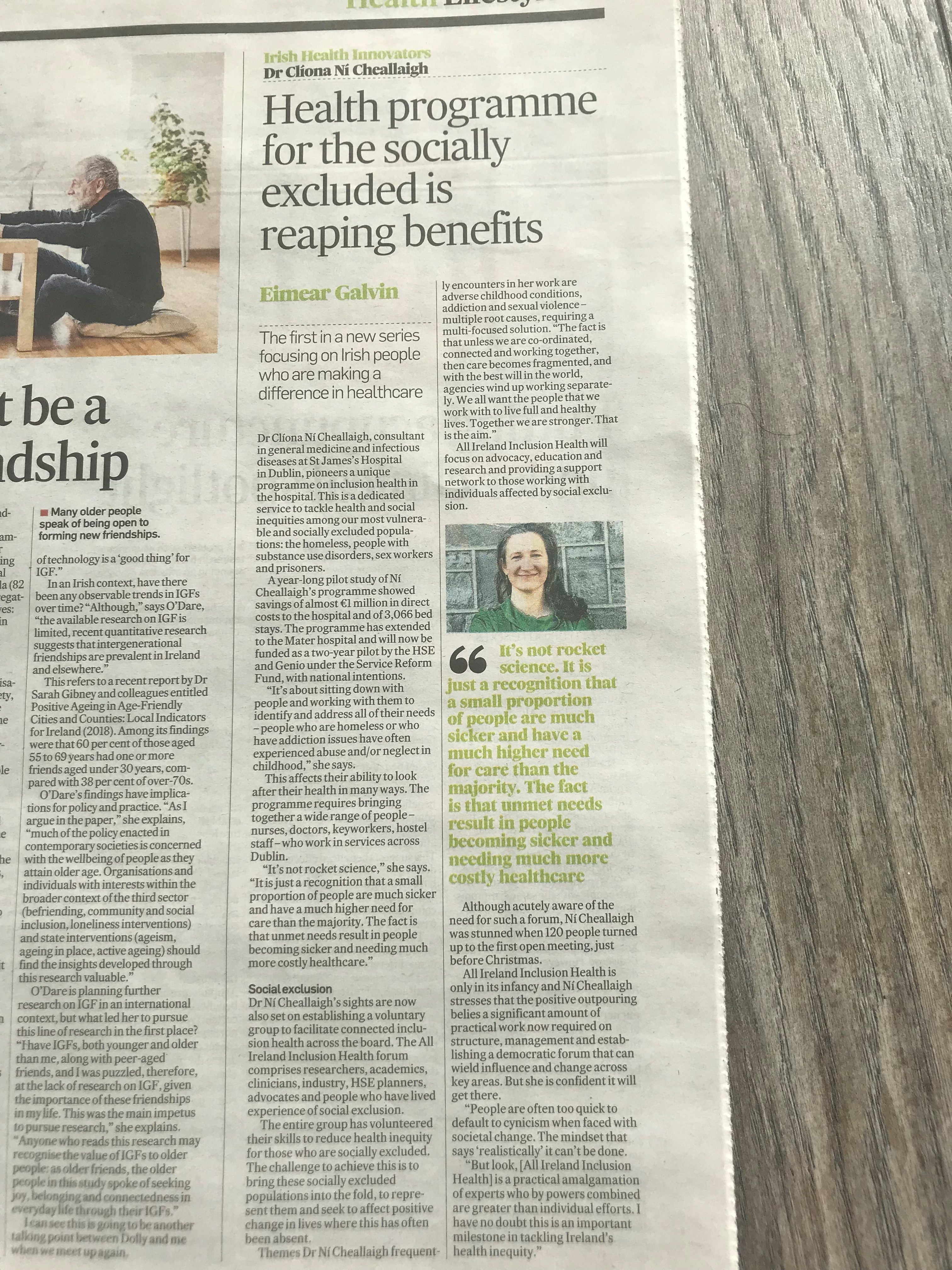New Irish Times series: Irish Health Innovators – Dr Clíona Ní Cheallaigh.

Working with Health Innovation Hub Ireland, we are lucky to meet people from Irish healthcare start-ups to people on the front line that are truly innovative. Damian Cullen, the Irish Times Health Editor has agreed to share some of these in a new series ‘Irish Health Innovators’, by HIHI Dublin Manager, Eimear Galvin.
Irish Health Innovator 1: Dr Clíona Ní Cheallaigh.
Dr Cliona Ní Cheallaigh, consultant in general medicine and infectious diseases at St James’s pioneers a unique programme on inclusion health in the hospital. This is a dedicated service to tackle health and social inequities among our most vulnerable and socially excluded populations: the homeless, people with substance use disorders, sex workers, and prisoners. A year-long pilot study of Ní Cheallaigh’s programme showed savings of almost €1m in direct costs to the hospital and 3,066 bed stays. The programme has extended to the Mater Hospital and will now be funded as a two-year pilot by the HSE and Genio under the Service Reform Fund with national intentions.
“It’s about sitting down with people and working with them to identify and address all of their needs”, Ní Cheallaigh explains, “people who are homeless or who have addiction issues have often experienced abuse and/or neglect in childhood. This affects their ability to look after their health in many ways. The programme requires bringing together a wide range of people – nurses, doctors, keyworkers, hostel staff – who work in services across Dublin. “It’s not rocket science, she says, “it is just a recognition that a small proportion of people are much sicker and have a much higher need for care than the majority. The fact is that unmet needs result in people becoming sicker and needing much more costly healthcare.”
Dr Ní Cheallaigh’s sights are now also set on establishing a voluntary group to facilitate connected inclusion health across the board. The All Ireland Inclusion Health (AIIH) forum comprises researchers, academics, clinicians, industry, HSE planners, advocates and people who have lived experience of social exclusion. The entire group has volunteered their skills to reduce health inequity for those who are socially excluded. The challenge to achieve this is to bring these socially excluded populations into the fold. To represent them and seek to affect positive change in lives where this has often been absent.
Themes Ní Cheallaigh frequently encounters in her work are adverse childhood conditions, addiction, and sexual violence – multiple root causes, requiring a multi focussed solution. “The fact is that unless we are coordinated, connected and working together then care becomes fragmented and with the best will in the world agencies wind up working separately. We all want the people that we work with to live full and healthy lives. Together we are stronger. That is the aim.” The AIIH will focus on advocacy, education and research and providing a support network to those working with individuals affected by social exclusion.
Although acutely aware of the need for such a forum, Ní Chealligh was stunned when 120 people turned up to the first open meeting, just before Christmas. Of that group, each individual wants to help – use their skillset, connections, expertise to establish a body that will seek to rebalance the health scales in Ireland.
The AIIH is only in its infancy and Ní Chealligh stresses that the positive outpouring belies a significant amount of practical work now required on structure, management and establishing a democratic forum that can wield influence and change across key areas. She is confident that it will get there. “People are often too quick to default to cynicism when faced with societal change. The mind-set that says ‘realistically’ it can’t be done. But look, AIIH is a practical amalgamation of experts who by powers combined are greater than individual efforts. I have no doubt this is an important milestone in tackling Ireland’s health inequity.”
Originally published: Irish Times, Tuesday May 7.




